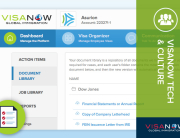“As a technology company, immigration is a means to getting top talent,” says Amy Gulati, former manager of HR operations at Cvent. “We’ve had to look at immigration as a benefit to these employees, because we really see them as valuable performers in our company. [For us, immigration is] a means to obtain the best talent, not just in the United States, but clearly around the world. They want to work in the United States, and we want them to be working for us.”
Delivering industry-leading event management tech tools to more than 15,800 customers worldwide is no easy feat. Cvent relies on its 1,900-strong global workforce to execute its business goals. An important contingent of that group are the nearly 200 sponsored employees — many of them are developers — on staff. Most of the expats reside in the United States and work toward continuing the company’s high-growth trend in its North America operations.
Cvent’s global hiring strategy has proven successful as these skilled workers have demonstrated their value throughout the organization. “Without their contributions our products would not be what they are,” Gulati says.
In addition to U.S.-bound immigration, Cvent fosters collaboration across its offices in the United Kingdom and India, with a global workforce program made up of long-term expat assignments abroad and short-term exchange programs for high-performing employees.
“Ideally, our business leaders would like to be able to send whomever, wherever, whenever, because that’s what drives business,” Gulati says. “You want to take your best people, corporate culture ambassadors or skilled people, to have them knowledge transfer or develop a new market. You don’t want immigration to be a roadblock to that.
Read the full case study here.








